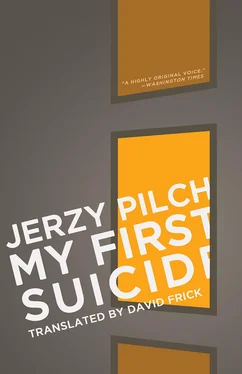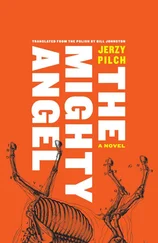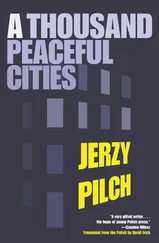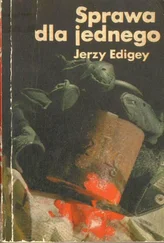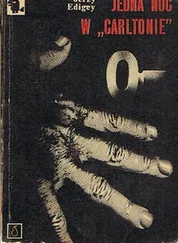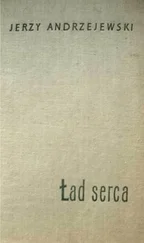“Wait, wait a minute.” On his pale countenance appeared what seemed to be a truly erotic flush. “Wait, wait a minute. It isn’t fitting that the chessboard be glued onto the tabletop. I’ll say more, Mr. Engineer, it isn’t fitting either that it be glued in, recessed. That is, it must be recessed, but it can’t be any chessboard taken from some sort of factory-made chess sets. It must be an original chessboard. And we will have to make it, cut sixty-four squares, half with dark veneer, half colorless. Or it would be even better if we make the dark squares of walnut, or even better, black oak, and the white of sycamore. This will harmonize with the pine and be elegant. Wait! Wait a minute!”
V
Wait, wait a minute. Toward the end of August, Master Sztwiertnia appeared with the finished miracle under his arm. He set it down carefully in our fieldstone-covered courtyard and began to unwrap it from under numerous layers of The Workers’ Tribune . The removal of the successive veils ought to have been like the baring of a body, like a striptease, but it wasn’t. That is, on the one hand it was something more, on the other something less. More, because the solicitude with which Sztwiertnia removed the subsequent sheets of The Workers’ Tribune was some sort of hyper-solicitude and hyper-tenderness. With such extreme delicacy one doesn’t disrobe a woman, with such extreme delicacy one doesn’t even dismantle an atomic bomb. Less, because the languor of the Master’s movements also flowed from the fact that he was drunk as a lord — a sensation in itself, since Sztwiertnia practically didn’t drink at all.
Finally, the incomprehensible architecture was made visible, finally there spread before us the view of a cathedral in the desert, of a statue extracted from the swamps, of a fresco unveiled from under layers of Roman plasters, and slowly we approached its curves, symmetries, and radiance, and nobody knew what to say, for none of us had known such beauty and such selflessness before. And no one knew that such a thing existed, that it even could exist. Even the women had delight in their eyes, because you could feel that, without the help of God, it was impossible to bring something like that into existence. And then we began to touch it, test it, push and pull the drawer, count the squares; to examine what sort of luster the chessboard had when viewed from an angle. And we examined Master Sztwiertnia’s masterpiece more and more conscientiously, more and more carefully did we follow its turns, leaps, and perspectives, and then we just stopped pretending that we were looking at it for the beauty of the construction, for the color, for the play of lights. Ever more impatiently and entirely openly and — that’s right — shamelessly did we investigate it, inch by inch, in search of the seal of love, which, on an object that perverse, must have been infinitely perverse. We pulled out the drawer and examined the bottom and the underside of the drawer, and the bay for the drawer, and we looked under the tabletop and everywhere. And there wasn’t anything anywhere, and we glanced with uncertainty at the Master, who stood nearby and smoked Extra Strongs. We looked at him in the hope that he would give us some hint, if only the path leading to the erotic miniature, which perhaps it would be necessary to study through a magnifying glass, but those studies would be well worth the trouble. The Master, however, didn’t say anything; he smoked, reeled slightly, came to, and once he had come to, and once he had finished smoking, he shook his head and said: “There isn’t anything there; that little table is the very essence of screwing in and of itself.”
VI
Everything was now ready — the hanging kitchen cabinet, the bookshelves that were to fill an entire wall — and innumerable boxes stood in the courtyard in a covered spot, where, supposedly, even after the war there had stood an ancient coach, and where its scattered and corroded specter still roamed. Services, sets of knives and forks, towels, three wedding presents that hadn’t been opened in ten years, a vacuum cleaner, photograph albums, books, a floor lamp, an exceptionally beautiful étagère, a gigantic couch, an even larger armchair (a present from the bishop), pieces of crystal, a Capital City radio, several bales of material for window curtains — all this was supposed to fit into the two Krakow rooms, in which we would finally start living like human beings.
“You don’t live like human beings here?” Grandma Pech asked. “Is rain pouring on your heads?”
“Rain isn’t pouring on our heads, but that doesn’t mean that we live like human beings. We have no life here at all. We are dying here. In any case, I will die here any moment now.”
Mother’s voice shook strangely and childishly. I didn’t really understand in any detail what was going on, but that it was a contest between life and death — this much was clear. In any case, it was clear at least once a week. Once a week, Father would come home from Krakow. Then my bed linen would be transferred from the great marital bed, where I slept excellently, to the hard couch against the wall, on which bad dreams tormented me and on which I always woke up in the middle of the night. The lamps at the head of my parents’ bed would be lit, Father would wander around the room in nothing but his pajama bottoms, shifting objects from place to place, poking around the books, and repeating — practically shouting — spasmodically: “Forgive me for living, just forgive me for living! Forgive me for living, but this doesn’t depend on me, although who knows, who knows!” Mother would follow my old man with a tired and hostile glance; on the other side of the wall, in the small room in which my grandparents slept, there would resound a cough, the floor would creak, you could hear shuffling, the door would open, Grandpa would appear in it in remarkable underclothes, and say: “Calm down, we beg you, calm down. Calm down. After all, you both have higher educations!” Father would find some book, put a jacket on his naked body, and go to the kitchen. Mother would turn out the light. I could still hear her spasmodic and despairing whisper. I would begin to fall off to sleep. The nightmares would return.
In the morning at breakfast, the talk was always about engineer Kowala, who had already made plans for the entire attic; the walls would be raised and brightened, there would be five rooms there and enough space that Józek would be able to set up even two ping-pong tables for himself. Father, pale and sleepy, would respond furiously that they should stop bothering him with ping-pong tables, because positing ping-pong tables as an element of a life-plan is a muddling of everything with everything else, it’s demonism. He doesn’t intend to play ping-pong, he intends to do something yet in life. “I have this capricious desire to do something yet in life that is in keeping with my education and interests. I know that this is incomprehensible for you, and that, in your opinion, I ought to just sit here and fart around, but I, unfortunately, am not interested. I want to do something in science. I won’t become an Einstein, because the war took away a good bit of my life, and you can’t get that back, but at least I want to try. Do you all understand? And he,” Father pointed with a nod of his head in my direction, “he also deserves a different start in life. Different from the one I got. I can’t do much for him, but at least I can provide him with a different start.”
VII
I packed my bags daily. Every day, I placed my books and toys anew in an old, navy blue suitcase. Depending on my mood, I would promise them a trip to Krakow or condemn them to stay forever in Wisła. “You didn’t acquit yourself today,” I would say to my Piko model train set, “the move to Krakow is an honor, and you haven’t earned it,” and I would remove the little cars and tracks, and I would close the suitcase ostentatiously, so that the victim was conscious of the irreversibility of its fate. “Do I make excessive demands upon you?” I asked my Finnish knife. “No, I demand of you elementary effort. I repeat: elementary effort. But you can’t even manage that. Unfortunately, Krakow is a city for tough people, not for wimps. Everybody off! Be my guest,” I would say to my stamp albums in an icy tone, “be my guest. If you don’t like it, just go on sitting here. Be my guest, sit here to the end of the world and fart around!” The following day I would return to grace those I had spurned, and I would cast into the abyss the Czech crayons, the East German sets of miniature tools, periscopes, slide projectors, magnets, adventure and fantasy novels, which were already feeling like they were practically in Krakow (you rested on your laurels too early, lazy bones!); and so on, over and over. I strutted about like a madman. I was an absolute ruler and absolutely capricious. I deserted my world, and with the ghastly delight of an underage emperor I cast it into the abyss.
Читать дальше
